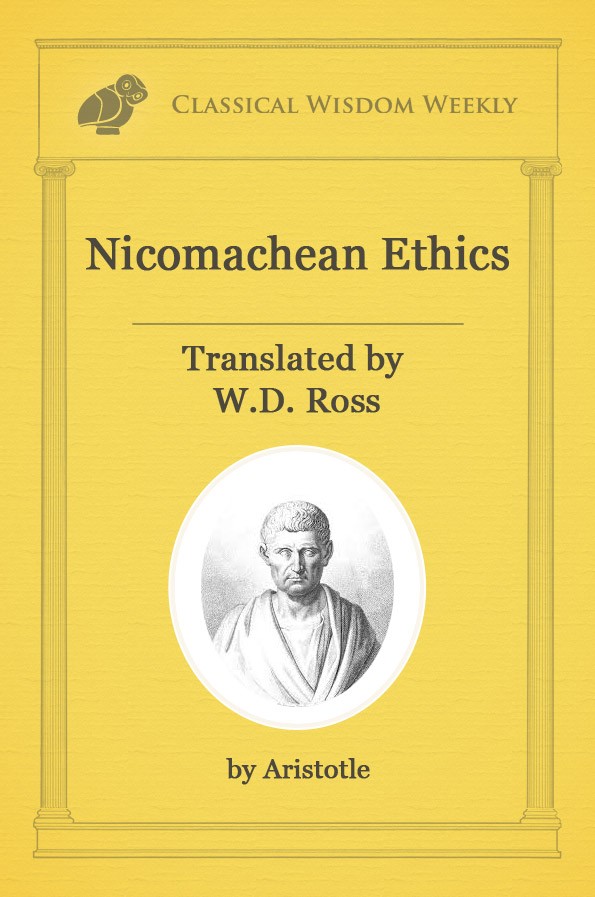By Aristotle
Written 350 B.C.E
Translated by W. D. Ross
Book IX
1
In all friendships between dissimilars it is, as we have said, proportion that equalizes the parties and preserves the friendship; e.g. in the political form of friendship the shoemaker gets a return for his shoes in proportion to his worth, and the weaver and all other craftsmen do the same. Now here a common measure has been provided in the form of money, and therefore everything is referred to this and measured by this; but in the friendship of lovers sometimes the lover complains that his excess of love is not met by love in return though perhaps there is nothing lovable about him), while often the beloved complains that the lover who formerly promised everything now performs nothing. Such incidents happen when the lover loves the beloved for the sake of pleasure while the beloved loves the lover for the sake of utility, and they do not both possess the qualities expected of them. If these be the objects of the friendship it is dissolved when they do not get the things that formed the motives of their love; for each did not love the other person himself but the qualities he had, and these were not enduring; that is why the friendships also are transient. But the love of characters, as has been said, endures because it is self-dependent. Differences arise when what they get is something different and not what they desire; for it is like getting nothing at all when we do not get what we aim at; compare the story of the person who made promises to a lyre-player, promising him the more, the better he sang, but in the morning, when the other demanded the fulfilment of his promises, said that he had given pleasure for pleasure. Now if this had been what each wanted, all would have been well; but if the one wanted enjoyment but the other gain, and the one has what he wants while the other has not, the terms of the association will not have been properly fulfilled; for what each in fact wants is what he attends to, and it is for the sake of that that that he will give what he has.
But who is to fix the worth of the service; he who makes the sacrifice or he who has got the advantage? At any rate the other seems to leave it to him. This is what they say Protagoras used to do; whenever he taught anything whatsoever, he bade the learner assess the value of the knowledge, and accepted the amount so fixed. But in such matters some men approve of the saying ‘let a man have his fixed reward’. Those who get the money first and then do none of the things they said they would, owing to the extravagance of their promises, naturally find themselves the objects of complaint; for they do not fulfil what they agreed to. The sophists are perhaps compelled to do this because no one would give money for the things they do know. These people then, if they do not do what they have been paid for, are naturally made the objects of complaint.
But where there is no contract of service, those who give up something for the sake of the other party cannot (as we have said) be complained of (for that is the nature of the friendship of virtue), and the return to them must be made on the basis of their purpose (for it is purpose that is the characteristic thing in a friend and in virtue). And so too, it seems, should one make a return to those with whom one has studied philosophy; for their worth cannot be measured against money, and they can get no honour which will balance their services, but still it is perhaps enough, as it is with the gods and with one’s parents, to give them what one can.
If the gift was not of this sort, but was made with a view to a return, it is no doubt preferable that the return made should be one that seems fair to both parties, but if this cannot be achieved, it would seem not only necessary that the person who gets the first service should fix the reward, but also just; for if the other gets in return the equivalent of the advantage the beneficiary has received, or the price lie would have paid for the pleasure, he will have got what is fair as from the other.
We see this happening too with things put up for sale, and in some places there are laws providing that no actions shall arise out of voluntary contracts, on the assumption that one should settle with a person to whom one has given credit, in the spirit in which one bargained with him. The law holds that it is more just that the person to whom credit was given should fix the terms than that the person who gave credit should do so. For most things are not assessed at the same value by those who have them and those who want them; each class values highly what is its own and what it is offering; yet the return is made on the terms fixed by the receiver. But no doubt the receiver should assess a thing not at what it seems worth when he has it, but at what he assessed it at before he had it.
Nicomachean Ethics Book IX









